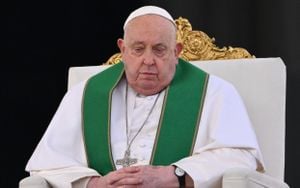Hungary has once again positioned itself as the primary obstacle to the European Union's (EU) unified response to the crisis stemming from Russia's invasion of Ukraine. The Hungarian government's reluctance to embrace EU sanctions against Russia, combined with its unique alignment with the negotiation efforts of former U.S. President Donald Trump, raises questions about the future of EU policy on this pressing issue.
During recent statements, Hungarian Prime Minister Viktor Orbán voiced skepticism about the effectiveness of current EU sanctions and emphasized the importance of fostering peace negotiations. He remarked, “We have always thought the Democratic administration would fall, and by Republican leadership under Trump, peace would be established, thereby boosting the economy.” This perspective showcases Hungary's desire for stability and support from the U.S. rather than intensifying the conflict through financial sanctions on Russia.
Supporting this sentiment, Péter Szijjártó, Hungary’s Foreign Minister, warned against the block renewal of sanctions targeting Russian and Belarusian individuals. Szijjártó argued, “We need to give time” for the U.S.-Russia talks, indicating Hungary's priority for diplomatic solutions over punitive measures. The deadline for extending these sanctions, which currently affect nearly 3,000 individuals and entities linked to the conflict, is March 15, and unanimity among EU member states is necessary for renewal.
Szijjártó went on to criticize the EU for hastily pushing decisions, which he believes hinder peace efforts. He firmly stated, “We will not support taxpayer money being used to prolong the war,” reflecting Hungary’s refusal to endorse any EU financial assistance to Ukraine, following the proposed 20 billion euro support package. This position reveals not just discomfort with the idea of financial aid for Ukraine but also highlights Hungary's longstanding cautious stance toward military involvement.
Historically, Hungary has demonstrated reluctance to send military assistance to Ukraine, which has strained its diplomatic relations with Kyiv. The Hungarian government’s opposition to EU sanctions on Russia, though it has ratified previous packages, reflects broader geopolitical tensions, with Orbán’s administration often aligning closer to Moscow's perspectives.
The situation has alarmed other EU officials and diplomats, who fear Hungary’s veto power might render the EU unable to collectively enforce sanctions or deliver assistance to Ukraine. One anonymous senior diplomat remarked, “I hope they will backtrack sooner or later, but what they are trying is really breathtaking.”
Hungary's past actions had seen the country temporarily block measures requiring unanimous consent among EU members, including sanctions on oil, coal, luxury goods, and more. The avenues for diplomatic remedy were temporarily opened when Hungary secured certain guarantees from the European Commission concerning gas disputes with Slovakia. This is indicative of Hungary's strategic maneuvering within the EU framework to leverage its interests.
Moving forward, the High Representative for Foreign Affairs and Security Policy of the EU, Kaja Kallas, has proposed new initiatives to provide lethal and non-lethal military aid to Ukraine until 2025. Kallas emphasized, “On the financial and military levels, we must do more,” which poses additional pressure on Hungary and other nations to align with EU objectives.
While Szijjártó continues to forge ties with Russia and align with Trump-era tactics, his statements during recent talks suggest Hungary may not easily yield to pressures imposed by the EU and Washington. The upcoming Foreign Affairs Council meeting, scheduled for March 10 to discuss the sanctions, looms with uncertainty about Hungary's final stance.
International relations experts caution against the rhetoric fueled by Trump, which could lead to complex negotiations and policy setbacks for the EU. One diplomat cautioned, “While Hungary is making inflammatory remarks, we constantly study their actions, which might reveal more synchronized alignment with broader EU goals.”
With diplomatic wrangling intensifying, the EU faces the dual challenge of sustaining collective unity against Russian aggression, and managing Hungary's defiance. The diplomatic strategies worth exploring may include flexibility around sanctions and alternative methods to circumvent Hungary’s veto power, as Kallas suggested utilizing “constructive abstention” or making contributions voluntary.
This situation exemplifies the precarious balance of power within the EU and highlights the geopolitical ramifications of individual member states prioritizing their national interests. The consensus on handling the Ukraine conflict remains fragile, with Hungary continuing to tread its controversial path.
Given the speed at which international diplomacy can shift, the next few weeks will be pivotal for EU foreign policy and Hungary's role within it. The culmination of these discussions and decisions will inform how well the EU can respond to the crises at its borders and assert its stance on the world stage.
Hungary's unique position demonstrates how national interest can disrupt collective efforts, posing significant challenges to the EU's ability to present a united front as it navigates through these turbulent times.



